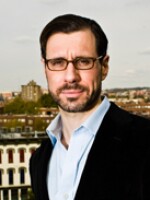RENEE MONTAGNE, host:
There's been no official comment about Mr. Cheney's visit to Georgia from Moscow, though his trip is certain to anger the Kremlin. Russia has so far ignored or dismissed Western warnings of economic and diplomatic consequences for its attack on Georgia. As NPR's Moscow correspondent Gregory Feifer reports, far from being concerned, the Russians are giving every sign of enjoying their defiance of the West.
GREGORY FEIFER: There's a feeling of euphoria inside Moscow's corridors of power these days. In the Parliament building, a stone's throw from the Kremlin, the leader of Russia's ultra-nationalists and misleadingly named Liberal Democratic Party says he enthusiastically supports Moscow's campaign against Georgia last month, with one exception.
Mr. VLADIMIR JIRINOVSKI (Leader, Russian Liberal Democratic Party): (Russian spoken)
FEIFER: I have gone further, Vladimir Jirinovski says. I have occupied all of Georgia, sacked Tbilisi, and arrested the Georgian president. Jirinovski revels in his role as the bad boy of Russian politics. He's well-known for his outrageous anti-Western rhetoric, and he doesn't disappoint now. Using a wooden stick to point toward a world map behind his desk, Jirinovski claims the United States provoked the conflict in Georgia because it's trying to encircle Russia.
Mr. JIRINOVSKI: (Russian spoken)
FEIFER: If the United States wants a new Cold War, he says, it would only benefit Russia. We'll switch to a regime of mobilization. We'll crank up our ideology, plow resources into our economy, and withdrawal our money from foreign bank accounts. Several years ago, Jirinovski's tirades could have been dismissed as representing the fringe of Russian politics, but no longer. Prime Minister Vladimir Putin has also accused the United States of provoking the conflict in Georgia for what he called election season politics. And on Sunday, President Dmitry Medvedev angrily rejected U.S. dominance in the world, while appearing to stake a claim to the old Soviet sphere of influence.
President DMITRY MEDVEDEV (Russia): (Through interpreter) Russia, like other countries in the world, has regions where it has privileged interests. These are countries in which we have traditionally had friendly relations and historical special ties.
FEIFER: Moscow has seen the expansion of NATO and the European Union eased into former Soviet Republics as the work of American imperialism and says its attack on Georgia, which wants to join NATO, set a new standard by which Russia will defend its interests in the world. The Kremlin says the United States has to acknowledge the reality of the post-American world and start adapting to it. In Moscow, critics of the tough new stance are hard to find. The Kremlin's increasing belligerent tone has helped marginalize Russia's already beleaguered political opposition.
Nikita Belykh, who heads the Liberal Union of Right Forces Party, says opposing the west enables the Kremlin to exercise power at home, far more easily than cooperating with the West.
Mr. NIKITA BELYKH (Leader of Liberal Union of Right Forces Party): (Through Translator) Integrating with Western institutions would require Russia to develop its economy, democracy, and civil society - serious institutional reforms that would take many years. It's precisely what the authorities put an end to because openness threatens their hold on power. They prefer an authoritarian, militaristic regime.
FEIFER: Moscow's use of force to redraw the map of an independent neighboring country and its ongoing occupation of Georgian territory is Russia's biggest challenge to the West since the collapse of the Soviet Union. So far, Western countries have taken no concrete action in response beyond warning of serious consequences for their relations with Moscow. But that's something Russia itself seems to want.
Gregory Feifer, NPR News, Moscow. Transcript provided by NPR, Copyright NPR.






